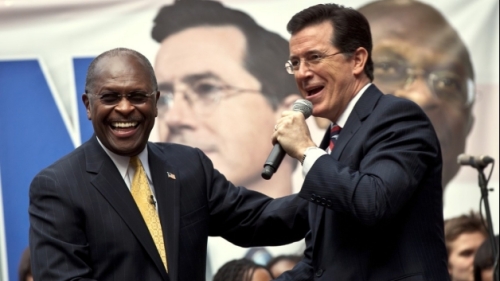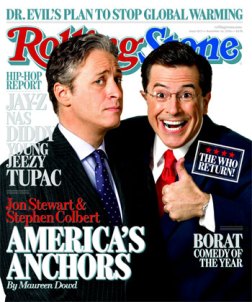How is it that a Comedian is teaching Americans more about civics than any politician?

A Brief Timeline
January 2010: The US Supreme Court rules 5-4 in Citizens United v. the Federal Election Commission, that the government may not prohibit organizations such as unions, corporations and political action committees (PACs) from spending money on political campaigns. The ruling was based on the premise that groups of citizens have the same rights as individual citizens and that spending money is a type of free speech protected under the First Amendment.
Shortly thereafter: PACs, which are essentially non-profit organizations that exist to advance the outcome of an election, political issue or legislation, begin to mutate into Super PACs. The main difference is that PACs were restricted in how much money they could spend on election campaigns, whereas Super PACs can spend unlimited amounts. Also, they are not permitted to coordinate with candidates for office. Super PACs are still required to disclose the source of their funds.
May 2011: Stephen Colbert establishes a Super PAC called Americans for a Better Tomorrow, Tomorrow, and begins soliciting viewers for donations to make tomorrow better. It should be noted here that Stephen’s lawyer is Trevor Potter, the former Commissioner and Chairman of the FEC (the losing side in the Supreme Court case referenced above).
August 2011: Colbert Super PAC’s first TV ad hits the Iowa airwaves. It was weird. The second was mildly disturbing.
September 2011: Stephen Colbert forms a shell corporation (usually established so that companies can do things indirectly in order to avoid publicity and taxes), which allows Stephen to anonymously direct unlimited amounts of money to his Super PAC. I repeat, anonymously! All legal!
January 2012: Stephen announces that he will explore a run for President in the South Carolina Republican primary election. To comply with non-coordination requirements, Stephen legally handed over control of his super PAC to fellow comedian and former boss, Jon Stewart. Colbert Super PAC began to be referred to as the “Definitely not coordinating with Stephen Colbert Super PAC”. As the two men pointed out, the fact that they were close friends and business partners was not a legal barrier.

South Carolina Ads: In the run-up to the primary, Stephen suggested that Mitt Romney is a serial killer. Since he could not get his name onto the ballot in time, and since Herman Cain had dropped out of the race already, Colbert Super PAC urged South Carolinians to vote for Herman Cain as a sort of perverted proxy candidate. And then there was the attack ad on how super PACs carry out too many attack ads. Even Samuel L. Jackson pitched in to narrate this ad, which actually attacks Stephen.
Conclusion: Through Herman Cain, Stephen managed to garner only 1.1% of the vote, good enough for a distant 5th place. But still, 6,324 registered Republican in South Carolina felt it worthwhile to vote for Stephen. I mean Herman. Not too shabby.

In the end, what Colbert and Stewart have shown is that the current interpretation of the law has so many loopholes that will certainly be exploited by moneyed interests. If Colbert and Stewart can legally claim to not be coordinating with one another and get away with their brand of fake political advocacy, there is nothing to stop corporations from wielding even more influence in an electoral system that is already saturated with money.
FYI – here is a list of Super PACs and the candidates they support.